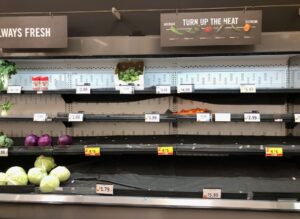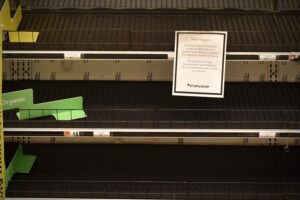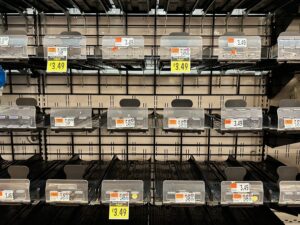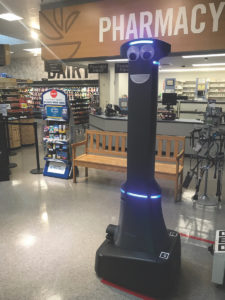PROVINCETOWN — On a windy Tuesday night here, shoppers who walked through the green light that runs across the entrance to Stop & Shop on Shank Painter Road encountered a sign taped to a display of handheld scanners: “Scan-It Is Out of Order.”

Beyond the scanners, the produce section was stocked with oranges, plastic boxes of raspberries, and mounds of bananas. But along the walls, where shoppers normally find broccoli, mushrooms, lettuce, peppers, and other produce, the shelves were bare.
Locals had been noticing a worse-than-usual lack of fresh food at the store since the previous day, Monday, Nov. 11.
“Where’s my salad?” asked Provincetown resident Dave Haase, who biked to the store for groceries on Tuesday. Haase grabbed the one remaining Taylor Farms Green Goddess Chopped Kit off the shelf and tossed it into his cart. He went to the meat department, which was also nearly empty. There, chicken breasts and thighs had been replaced by a sign saying: “Inventory may be limited for certain products due to a systems issue.”

Assistant store manager Dylan Dossantos of Eastham, who was in the store that night, said the shortages had to do with an IT issue in the supply chain. He said the problem had affected stores all the way up the coast from New York, including the Stop & Shop stores in Dennis and Orleans.
Ahold Delhaize USA, a division of the Dutch grocery giant that owns Stop & Shop, announced on Nov. 8 that it had recently detected a “cybersecurity issue” in its U.S. network. Ahold also operates Hannaford and three other “omnichannel grocery brands” that together make up the largest grocery retail group on the East Coast, according to the company’s website.
The problem had affected not only grocery stores but also some “other services including a number of pharmacies and certain e-commerce operations,” according to the company’s statement.
“Immediately upon detecting the issue, our security teams began an investigation with the assistance of external cybersecurity experts,” the statement said. “We also notified law enforcement.”
While the company’s statement implied that there might have been a cyberattack, officials did not answer the Independent’s questions about the nature of the breakdown, nor would they confirm whether the problem has been solved.

Employees at the Provincetown Stop & Shop and company officials reached by telephone all said they were not allowed to speak about the problem behind the inventory shortages.
Stop & Shop Corporate Communications Manager Caroline Medeiros told the Independent in an email on Nov. 18 that “while there may be some limited inventory for certain products, we are working to re-stock our shelves and anticipate item availability to continue to improve over the next few days.” She added that the stores were well stocked with turkeys and hams for Thanksgiving.
The company has kept the stores open, but as of the Independent’s deadline on Tuesday, Nov. 19, the issue had not been resolved — fresh food remained scarce on its shelves both in Provincetown and Orleans.
J&E Produce, a local grocery warehouse, is just around the corner from Stop & Shop at 20 Province Road in Provincetown. The company distributes fresh food to local markets and restaurants, and for the last two years owner Robert Enos has been trying to get Stop & Shop to be a customer, he said, but the company has not responded to his inquiries.
“People tell me all the time, ‘Bobby, they ran out of broccoli,’ ” said Enos, standing next to 25 cases of fresh broccoli in his warehouse. “I’ve sent Stop & Shop letters saying who I am and what we do, but it only goes to a certain point in the chain of command.

“I feel bad when I go over and look at those empty shelves,” Enos added. “I have all this produce sitting right here: peppers, squashes, broccoli. I’m so close. It takes me three minutes to walk from my warehouse to Stop & Shop. I have a hard time wrapping my head around it.”
Enos thinks the problem is a supply chain that is overreliant on automation. He gets his products from the New England Produce Center in Chelsea, just outside Boston. “All the produce centers go through there,” Enos said. “There are no supply issues.”
Stop & Shop’s own distribution center is in Assonet, about a two-hour drive from Provincetown, so, closer to town than Chelsea. But Enos said it’s likely that a high degree of automation has made it impossible for the company to access its own products and plan deliveries.
Ahold Delhaize USA announced plans to modernize its supply chain in 2019, moving to a “fully-integrated self-distribution model,” according to a May 9, 2022 press release.
“This will result in efficiencies and most importantly product availability and freshness for customers of our local brands — now and in the future — whenever, wherever, however they choose to shop,” said former CEO Kevin Holt in that statement.
The self-managed network was intended to support Ahold brands’ “omnichannel growth,” the statement said.
In July, Stop & Shop announced it would close 32 stores across the Northeast, including eight in Massachusetts, in order to “position the company for growth.” None of those targeted for closure is on Cape Cod, according to a July 12 report published on the WBUR public radio website.

